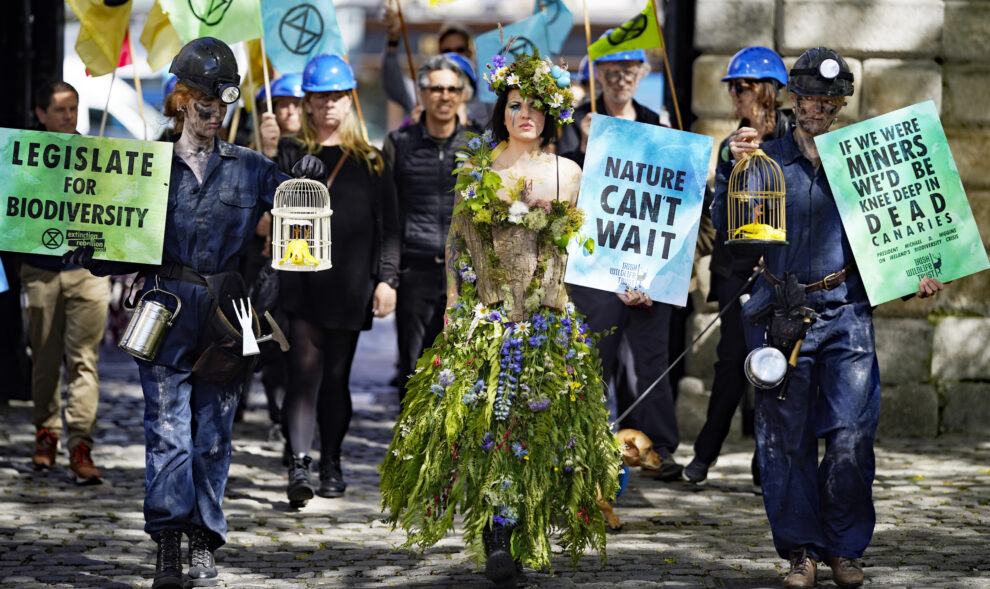Ireland—a nation synonymous with its abundant, verdant landscapes—is considering a nationwide referendum on the rights of nature and the human right to a healthy environment.
If that happens, Ireland would become the first European country to constitutionally recognize that ecosystems, similar to humans and corporations, possess legal rights. More than two-thirds of the 27 European Union countries already recognize a universal human right to a healthy environment.
In December, a legislative committee proposed that the Irish government take a series of administrative measures to draft proposed constitutional amendments recognizing that nature has inherent rights to exist, perpetuate and be restored, and that humans have a right to a clean environment and stable climate.
To take legal effect, the proposed amendments must be approved by both houses of parliament, the Dáil Éireann (the lower house) and the Seanad (the upper house), and win a majority of the popular vote.
The idea for the dual amendments emanated from a March 2023 Citizens’ Assembly on Biodiversity Loss, which produced more than 80 recommendations aimed at addressing the mass extinction of plants, animals and other living beings. Human activity is driving the annihilation of other species at an unprecedented rate, with over 1 million on the brink of extinction.
In 2019, Ireland declared a national biodiversity emergency. More than 70 percent of Irish peatlands are damaged, 50 percent of its freshwater systems are in “poor and deteriorating condition” and more than one-third of Ireland’s protected species are in population decline, among other problems.
Mari Margil, executive director of the U.S.-based Center for Democratic and Environmental Rights, was one of several rights of nature advocates who told Irish lawmakers in October about the global rights of nature movement and how policymakers around the world are embracing the idea to change “how we govern ourselves toward nature, and how nature itself is treated under law.”
At least six countries—Ecuador, Bolivia, Panama, Uganda, New Zealand and Spain—have some form of national law recognizing the rights of nature or legal personhood for ecosystems. Many more nations have some form of court recognition or local laws recognizing nature’s rights. Those rules generally provide a higher level of legal protection to ecosystems or individual species, compared to conventional environmental protection laws.
Advocates and lawyers behind this jurisprudence claim that it is prompting a massive narrative shift from the majority view that nature—forests, waterways and other ecosystems—are “things” that humans have a right to use, exploit and, ultimately, destroy.
Rights of nature laws generally do not ban humans’ use of ecosystems or ban activities like hunting and fishing. Rather, the laws aim to protect the integrity of habitats so that they can persist into the future and maintain their natural cycles. The laws also do not abolish other rights, like humans’ right to private property, although, as with all other rights, there are inevitably clashes between competing interests.
Some critics have called the laws “anti-human,” and claim that the rules will chill investment in mining and other extractive projects.
The movement has roots in the worldviews of many Indigenous cultures. Its proponents argue that their close connections to nature can help to reorient mainstream legal, political and economic systems to the reality that humans are part of the natural world and interdependent with all other living beings. That shift, they say, would put guardrails on human activities to prevent unsustainable behaviors.
In October, Peter Doran, a law professor at Queen’s University Belfast, told Ireland’s Joint Committee on Environment and Climate Action that Ireland is a nation of both human citizens and the “more than human—all the ecosystems, the landscapes, the rivers, trees and mountains whose daily labor make our lives possible, make our rights meaningful, our economies possible.”
Doran, who provided testimony on the Citizens Assembly proposals, questioned the effectiveness of more than 50 years of global environmental lawmaking. With six of Earth’s nine planetary boundaries like ocean acidification and ozone levels having been breached, Earth is in the midst of its sixth mass extinction event, and climate change is accelerating, he said.
“That old toolbox puts humans first,” Doran said, referring to conventional legal rules that regulate the pace and amount of pollution. “There is increasing concern that we humans have designed our political, economic, legal and environmental solutions using the very toolbox that has brought us to the brink.”
Ireland has amended its constitution more than 30 times since it came into force in 1937. The Citizens’ Assembly proposal recommended that the government appoint an expert panel to draft proposed rights of nature and right to a clean environment amendments.
Other 2023 Developments
Ireland is not the only place advancing the rights of nature movement this year.
Aruba also took steps toward constitutional recognition of nature’s rights. Panama, which first recognized the rights of nature in 2022, enacted new legislation specifically recognizing the rights of sea turtles. In November, Panama’s Supreme Court struck down as unconstitutional the approval of a concession to one of the world’s largest copper mines. In doing so, the court made reference to the 2022 national rights of nature law.
That law, the court wrote, “implies that the Panamanian state must have the necessary public policies to ensure ‘the highest interest of nature’ now for its intrinsic value, and regardless of the utilitarian value it has for human beings.” Consequently, the court said, the state has an obligation to protect, respect, and restore nature’s vital cycles, and the existing legal rules do not meet that level of protection.

Constanza Prieto Figelist, Latin America legal director at the U.S.-based Earth Law Center, said the ruling showed that rights of nature laws require governments to “give stronger consideration to the health and intrinsic value of nature when overseeing mining and other activities, elevating the interests of species and ecosystems to a higher status alongside human interests.”
In March, an Ecuadorian provincial court struck down a mining license to a Chilean company operating a copper mine in the Intag Valley on grounds that the operation violated the rights of nature, among other reasons. The decision follows major rulings from Ecuador’s Constitutional Court enforcing the country’s constitutional rights of nature provision. So far, Ecuador is the only nation to constitutionally recognize nature’s rights.
On the sidelines of the climate summit in Dubai, activists launched a campaign for the recognition of Antarctica as an autonomous entity with the right to “regenerate and evolve free of human disruption.”
In the United States, a lawsuit asserting the rights of salmon ended in a settlement earlier this year whereby the city of Seattle agreed to create dam passageways for salmon to move around hydroelectric dams. Also in Washington state, a handful of cities issued symbolic proclamations recognizing the rights of orcas. Activists there said they are hoping to build local consensus before taking the issue to state policymakers.
In October, Milwaukee County, Wisconsin recognized the rights of nature, noting that it was following the lead of the Menominee Tribe of Wisconsin, which had previously recognized the inherent rights of the Menominee River to flourish and naturally exist.
Not all developments in the movement dealt with lawmaking. The Indigenous-led organization Movement Rights held rights of nature trainings for five tribal communities and held the second annual “Convening of the Four Winds,” where members of more than 50 tribes spoke about water protection, including the Ponca Nation’s “Immutable Rights of Rivers” law.
In November, the Indigenous Environmental Network hosted an Indigenous Just Transition Southwest Regional Gathering, where members of grassroots tribal communities shared knowledge and practices touching on food sovereignty, regenerative economies and Inherent Relationships Jurisprudence, which is a legal philosophy that draws from the intrinsic relationship between Indigenous peoples and Earth, and that is aimed at advancing Indigenous peoples’ sovereignty, customs and knowledge, among other things.
The concept is related to, but distinct from, the rights of nature, the latter of which is derived from a western legal framework. Inherent Relationship Jurisprudence, by comparison, emanates from Indigenous legal systems and includes the understanding that there is no separation between Indigenous peoples and Earth, and that in western legal frameworks, their rights are bound together.
In Cleveland, a Truth, Reckoning, and Right Relationship with the Great Lakes event took place this fall aimed at surfacing community members’ experiences with existing legal, political and economic systems and how those systems have contributed to the “ill health” of the Great Lakes.
Patricia Gualinga, a Kichwa leader from the Ecuadorian Amazon and rights of nature advocate, published the childrens’ book “Stand as Tall as the Trees,” recounting her community’s pathbreaking fight to save their “living” forest.
And in October, Pope Francis published a papal letter entitled Laudate Deum, or Praise God, affirming his previous support for the rights of nature movement. “For ‘we are part of nature, included in it and thus in constant interaction with it,’” the Pope wrote, adding that Indigenous cultures have, over centuries, interacted with their environment “without destroying or endangering it.”
Source: Inside Climate News
















